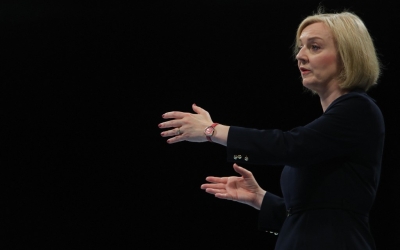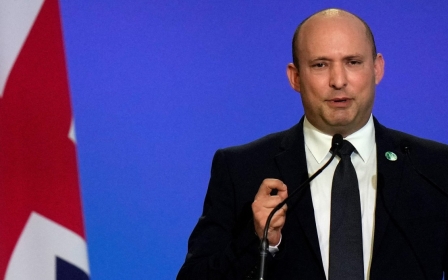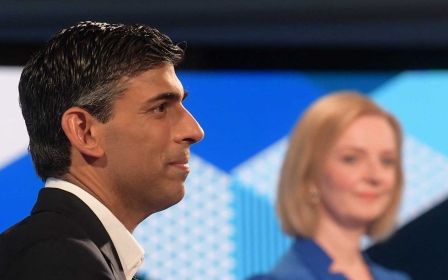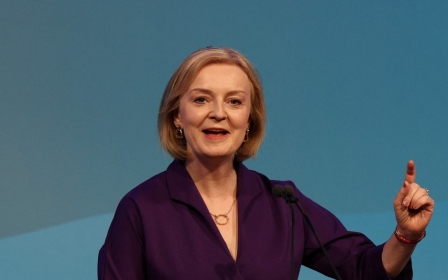Liz Truss moving UK embassy to Jerusalem would be disastrous
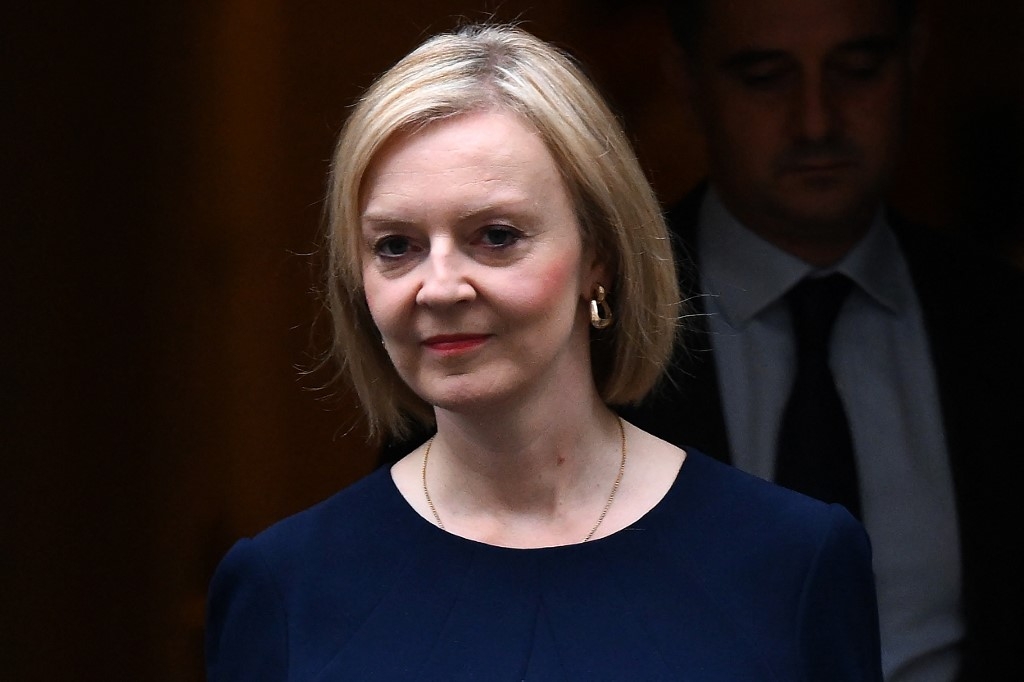
During her campaign for the leadership of the British Conservative Party, Liz Truss told the Conservative Friends of Israel (CFI) that, if elected, she would consider relocating the British embassy from Tel Aviv to Jerusalem. At a subsequent meeting at the UN, Prime Minister Truss repeated the promise of a review to her “good friend” Yair Lapid, the interim Israeli prime minister.
The status of Jerusalem is the thorniest issue in the Israeli-Palestinian conflict, one of the most bitter, prolonged and intractable international conflicts of modern times. East Jerusalem, along with the rest of the West Bank and the Gaza Strip, were captured by Israel in the June 1967 war and have ever since been viewed by the international community as occupied territory.
It is difficult to think of a foreign policy issue that is less in need of a review than the location of the British embassy in Israel
Israel claims the entire city as its eternal, undivided capital, while the Palestinians claim the eastern part as the capital of their hoped-for future state.
Israeli officials were naturally delighted that Truss floated the idea of moving the embassy to Jerusalem, and thereby recognising Israeli sovereignty over the city, as one of her first foreign policy moves as prime minister.
Palestinian leaders have warned that moving the embassy would undermine the two-state solution and destroy their relations with Britain. Husam Zomlot, the Palestinian ambassador to the UK, said it was “extremely unfortunate” that Truss used her first appearance at the UN as prime minister to “commit to potentially breaking international law”.
New MEE newsletter: Jerusalem Dispatch
Sign up to get the latest insights and analysis on Israel-Palestine, alongside Turkey Unpacked and other MEE newsletters
Violating UN resolutions
It is difficult to think of a foreign policy issue that is less in need of a review than the location of the British embassy in Israel. Moving the embassy to Jerusalem would violate a raft of UN resolutions and amount to an abrupt reversal of British policy since 1967. This policy, part of a broad international consensus, has held that all embassies should stay in Tel Aviv until a comprehensive peace agreement is reached between Israel and the Palestinians, with Jerusalem as the shared capital of two states.
During her tenure as foreign secretary, Truss made no attempt to relocate the embassy. One can only speculate that she instigated the review for reasons of political expediency: to ingratiate herself with Israel and its supporters in Britain, and more specifically, with the CFI, whose membership includes most of the cabinet and around 80 percent of Tory backbenchers.
One Israeli newspaper recently described Truss as potentially the “most pro-Israel British prime minister ever”. This was no doubt intended as praise, but it ignores Britain’s historic responsibility for creating the problem in the first place.
The Israeli-Palestinian conflict was made in Britain. It all began with the Balfour Declaration of 1917 in support of a national home for the Jewish people in Palestine, although the Jews were only 10 percent of the country’s population at that time. The commitment that this would not be at the expense of “non-Jewish communities” was completely ignored by successive British governments. The declaration thus enabled a systematic Zionist colonial takeover of Palestine, a process that is still ongoing.
In June 1967, Israel completed the takeover of the whole of historic Palestine. Two weeks after the guns fell silent, Israel unilaterally annexed East Jerusalem and merged it with West Jerusalem. The UN Security Council immediately denounced these measures as unlawful and invalid.
In 1980, when the Knesset formally annexed East Jerusalem, the Security Council censured Israel “in the strongest terms”. The United Kingdom voted for all of these resolutions.
Outrage and condemnation
US President Donald Trump was first world leader to break the long-standing agreement of the international community not to base embassies in Jerusalem until a two-state solution to the Israeli-Palestinian conflict is reached. His decision to move the American embassy to Jerusalem in 2018 was met with outrage across the Arab world and provoked widespread international condemnation. It also led to a flareup of violence in which dozens of Palestinians were killed by Israeli forces. Theresa May, the British prime minister at the time, criticised the move.
Trump’s much-vaunted “deal of the century” was a crude attempt to redefine the two-state solution as Greater Israel, including about a third of the West Bank and the whole of Jerusalem, and a fragmented Palestinian mini-state surrounded by Israeli settlements and military bases. It was promptly and contemptuously rejected by the Palestinian Authority (PA).
Despite Trump’s best efforts, only three states have followed his example of moving their embassies to Jerusalem: Kosovo, Guatemala and Honduras. All other 82 countries with diplomatic missions in Israel opted to keep their embassies in Tel Aviv. Some of these countries, including Britain, also have a consulate general in East Jerusalem, which serves as a channel of communication with the PA in Ramallah.
In her singularly pro-Israel stance and apparent indifference to Palestinian rights, Truss belongs to the mainstream of her party. All three prime ministers under whom she served have been staunch supporters of Israel. David Cameron described himself as a “passionate friend” of Israel and insisted that nothing could break that friendship.
Theresa May was probably the most pro-Israel leader in Europe during her premiership. In an address to the CFI in 2016, she described Israel as a “remarkable country … a thriving democracy, a beacon of tolerance, an engine of enterprise and an example to the rest of the world”. She furiously rejected a public petition, of which I was one of the signatories, to issue an official apology for the Balfour Declaration.
Strained relations
Boris Johnson carried the Israel-first Conservative policy a step further by placing Israel above international law. He resisted attempts to call it to account for its illegal actions and war crimes. In 2021, he announced that he opposed an International Criminal Court investigation into alleged war crimes in the occupied territories, noting in a letter to the CFI that while his government respected the independence of the court, it opposed this particular inquiry.
“This investigation gives the impression of being a partial and prejudicial attack on a friend and ally of the UK’s,” he wrote. The perverse logic of this statement is that being a friend and ally of the UK places Israel beyond international law and international scrutiny.
Like Johnson, Truss is a passionate proponent of post-Brexit Global Britain. Breaking international law, however, will do nothing to promote this brand - nor will it help to get a trade agreement with the US, which was touted as one of the major benefits of an independent foreign policy.
To move the British embassy from Tel Aviv to Jerusalem would be morally indefensible, legally questionable and politically damaging
Truss’s loudly proclaimed intention, when she was foreign secretary, to unilaterally scrap the agreement with the European Union on Northern Ireland had already strained her relations with US President Joe Biden because of the peril he thought this would pose to the Good Friday agreement.
Following Trump’s example by moving the British embassy to Jerusalem would not go down well in the White House. Although Biden has not reversed the move of the American embassy, he has undertaken a series of measures to limit the damage done by his predecessor, and he has reverted to working with allies through the UN.
To move the British embassy from Tel Aviv to Jerusalem would be morally indefensible, legally questionable and politically damaging. It would be one of the most savage British blows to Palestinian statehood since the Balfour Declaration. It would also encourage Israel to continue to act with impunity, reinforcing the arrogance of power.
Israel and its supporters in this country would surely welcome the move, despite the damage to Britain’s standing in the world.
Rather than review the location of its embassy, the British government should reassess its relationship with Israel in light of present-day realities. In the last two years, reports by three major human rights organisations have concluded that Israel has become an apartheid state. These reports carefully document Israel’s ongoing ethnic cleansing, land confiscations, house demolitions, persecution of human rights defenders, detention of minors and tolerance of settler violence.
The sad truth is that since 1967, Israel has become addicted to occupation. A true friend does not indulge an addiction but tries to wean the addict from it.
The views expressed in this article belong to the author and do not necessarily reflect the editorial policy of Middle East Eye.
Middle East Eye delivers independent and unrivalled coverage and analysis of the Middle East, North Africa and beyond. To learn more about republishing this content and the associated fees, please fill out this form. More about MEE can be found here.



